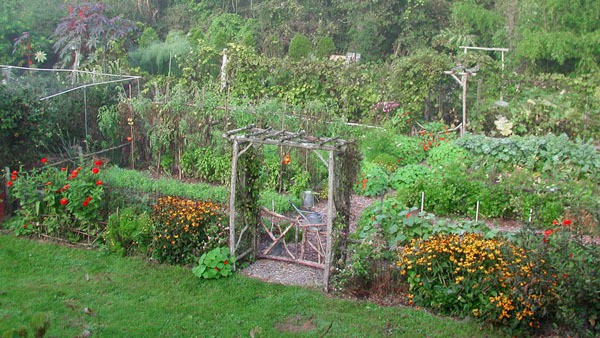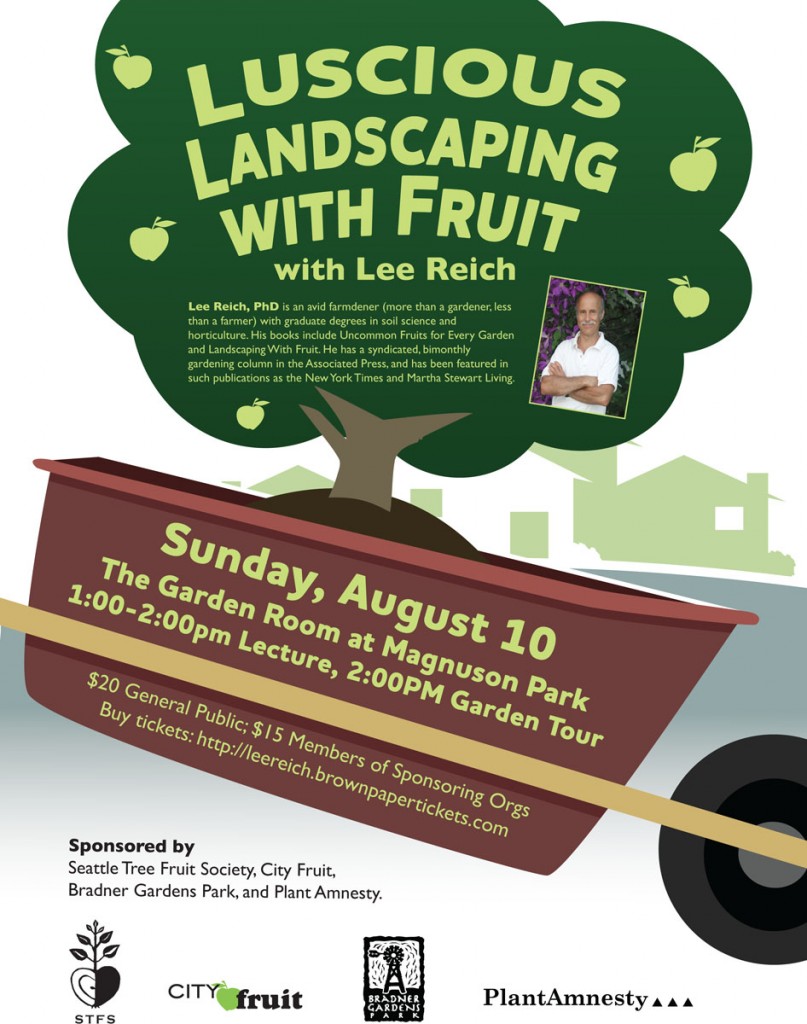There are moments when audacity pays off. For years – years! – I’ve been full-on Fan Girl for garden writer Lee Reich. Lee’s been writing incredibly useful, readable books and magazine articles for decades and I’ve been learning from his expertise for about as long as I’ve been gardening.

Lee Reich: fruit guru.
So when I heard Lee was going to be in the Seattle area teaching people how to landscape with fruit, I dropped him a line and asked if he’d be willing to join me on the Grow Edible Podcast. To my rather huge shock and excitement, he said yes. So if I sound nervous in this interview, keep in mind I’m basically casually chatting pawpaw varieties with one of my gardening heroes.

Lee Reich’s garden. It wins awards. Obviously.
Show Notes
Join us today as we discuss:
- What is soil, and if it’s the same as dirt.
- Lee’s Top Five Picks for uncommon fruits: gooseberries, alpine strawberries, black currants, shipova, and Nanking cherries.
- What a pawpaw tastes like, and what early ripening pawpaw cultivar is best for short season climates.
- Juneberry shrubs, a widely-planted, tough-as-nails ornamental with a delicious berry.
- What berries Lee loves for juicing.
- The first steps for setting up a luscious landscape of edible fruits.
- How to simplify backyard orchard management and set yourself up with a lower maintenance edible landscape.
- What unusual edibles have local commercial viability for small farms.
- How Lee simplifies very complex scientific and horticultural knowledge into informative, beginner-friendly books.
- What gardening myths Lee wishes would just go away, including the hard facts on fungally vs. bacterially dominant soil, compost tea and gardening by the moon.
- Lee’s upcoming events in the Seattle area – go see him!
Resources for Today’s Episode

- Uncommon Fruits for Every Garden, Lee’s presentation on rare and lesser-known edibles, is taking place on Saturday, August 9, 2014, from 11:00 a.m. to 2:30 p.m. at the WSU Mount Vernon Northwestern Washington Research and Extension Center. Details here.
- Luscious Landscaping with Fruits: A Lecture & Garden Tour with Dr. Lee Reich is taking place on Sunday, August 10, 2014, from 1:00 pm to 2:30 pm at Magnuson Park in Seattle. Details here. Buy tickets here.
- Lee is presenting at the 2014 Joint Conference of the Home Orchard Society, North American Fruit Explorers and the California Rare Fruit Growers. This conference is taking place from August 5 to August 9, 2014 near Portland, OR. Details here.
- Lee’s website and excellent blog.
- Lee’s books. I particularly recommend Landscaping with Fruit, The Pruning Book and Weedless Gardening.
- The type of steam juicer I use when I need to convert a lot of fruit into juice easily.
The Giveaway!

I’m giving away a copy of Lee’s book Landscaping with Fruit. I love it. With super lush photos, it’s garden porn at its best, but its full of great practical info too. For ambitious fruit growers who want to create their own luscious landscape, this book is one of my top recommendations.
To be entered to win a copy of Landscaping with Fruit, just leave a comment on this post with the answer to the podcast trivia question. You’ll find the trivia question right up in my intro, and Lee gives the answer over the course of our conversation.
Giveaway closes Wednesday, August 13th 8 pm PDT. Winner will be notified by email. One entry per person, open to U.S. addresses only.
Podcast Stuff
Not seeing the podcast player? You’re probably viewing this in your email. Click here to be taken to the web-version of this post, complete with podcast player where you can play or download this podcast.
If you like this new podcast series, you might want to subscribe in iTunes or add the Podcast RSS feed to your preferred podcast reader. If you think I should keep this up, help me grow the podcast by leaving a good review or comment in iTunes – that really helps.
The theme music for the Grow Edible Podcast is Rodeo, graciously provided by my dear friend, the supremely talented Kristen Ward. You can find Kristen’s music on iTunes and Amazon. Rodeo is off the Last Night on Division album – it’s one of my favorites!
Perpetual hat tip to Erik and Kelly of Root Simple, the cool Godparents of the urban homesteading movement. Erik and Kelly put out a sharp and edutaining podcast in addition to writing great books, running a fantastic blog and generally spreading their urban farm wisdom far and wide. They graciously allowed me to steal their phrase “audio companion.”
4
Thanks for the great interview with Lee Reich. Good stuff. I learned that the store variety “currants” are usually Corinth grapes. Who knew? I will go back and listen to your previous podcasts as well.
I’d already heard about the currant-Cornith grape mix up but I didn’t think it was true. Thanks for the facts.
Great podcast. I’ve followed Lee for a while now and enjoy all that he teaches. But I did not know that Cornith grapes were disguised as currants until now.
Black Corinth grape!
Black corinth grapes as currants? Who knew?
I am moving up your way in two weeks and starting landscaping on a mostly blank slate 1 acre as you said. I look forward to incorporating some of these ideas! I wonder why “currants” are from the Corinth grapes and not currants. Who came up with that?
Great podcast. Weed less Gardening changed my whole approach to gardening. The answer to the trivia question is black Corinth grapes.
Black Corinth Grape. This is the book I need! I’ve told my wife for years, “If I can’t eat it, we aren’t planting it!” Of course she ignores me and plants her flowers anyway…
Oh, yes, please. Black Corinth Grape! We’ve been trying to work in more native strawberries and some creeping raspberries as ground cover in the border of our garden, and the front yard fence is full of grapes right now, but there’s so much more we could do.
Ohhh! Corinth grapes!
Grapes as currants? Who knew?
Ok, is it too much cheating to put the answer down before I actually hear it? I’m listening, but as I read the comments above, I’m inclined to think that the answer coming up is “Black Corinth Grape”…
Black Corinth grapes… aka champaign grapes.
I had no idea that currants were actually grapes! I’m obsessed with blackcurrant syrup in my Guinness Stout, like I had in Ireland at my sister’s wedding. Try it, OMG. This lecture at Magnuson Park looks like we shouldn’t miss it! Thanks!
Black Corinth grapes.
I enjoyed the podcast, and would love to win! Black Corinth grapes are dried to make currants.
Oh this book has been in my wish list! Love planting and growing food plants in the ” landscape” as well as the garden. Grapes.
Corinth grapes! Who the hell knew that!! Thanks
black cornith grape????? is that why currants are so seedy?
black corinth grapes, but he also talked about gooseberries…
Black Corinth Grape
Edible Landscaping… I barely look at ornamentals anymore unless they can feed me or feed the pollinators. Like the black corinth grape.
I’m loving all the great podcasts you’ve been doing! I still want to see a post detailing the building of your pond, though. 🙂
Oh, and store-bought “currants” are not currants at all, but are Corinth grapes.
Good podcast! I been wanting to find something to put in the front yard and perennial fruit bushes and trees are very much under consideration. I hope he has some information suitable for a more southern climate than both of your current locations.
Black Corinth grapes!
Black Corinth grapes
Black Corinth Grapes!
Black Corinth grape. Love the podcast!
I always wondered about that. My black currant bush was one of my all time favorite fruit producers in Wisconsin, because the fruit went from green to black without going red in between. This totally fooled the birds, who were rampant and greedy about my cherries, my blueberries, my strawberries, my everything! I never had to wrap the black currant bush in netting, which made it my easiest crop. After the initial planting, all I really did was harvest. I always made black currant syrup, but I wondered about dried currants. Black Corinth Grapes – maybe I should try growing those, now that I’m in Portland.
Black Corinth grapes. What a good interview from a knowledgable guy!
The answer is Black Corinth Grapes. Okay, at the risk of exposing my LACK of exposure to the gardening world, I had not heard of your guest Lee Reich until this podcast. Thank you so much for broadening my horizon. I rushed to bookmark his website after listening to him and immediately subscribed to him blog. I cannot wait to get my hands on his books. Way over here on the east coast, I’m totally just bumbling along in my own self-educated adventures in urban homesteading. In massachusetts, urban homesteading is extraordinarily uncommon, so there isn’t really a local community to reach out to. There are billions of gardeners, but mostly ornamental gardeners or recreational veggie gardeners. What a fabulous new resource for me. I have a quick question for you. Is there a difference between Gooseberries and Giant Cape Gooseberries. We grew Giant CGB’s for the first time last year, only because someone randomly gave us some seeds. They were *amazing*! And they breed true, because we’ve got a bunch of volunteers in the garden this year (which was a delightful discovery for us.) Thank you again, Erica, for a wonderful podcast, and happy homesteading!
Hi Kathy – to answer your question, yes, Gooseberries and Cape Gooseberries are totally different fruits. Between that and the grape/currant thing, sometimes it’s like the gardening world is just messing with people, right? 🙂 Cape Gooseberries are actually related to tomatillos and they are very good about self-seeding. They are a tender perennial typically grown as an annual in northern areas. The gooseberries Lee is talking about are woody perennial shrubs that are quite hardy. They produce berries about the size of a marble that are super juicy and sweet-tart. The flavor of the berries varies greatly by variety – some are very much tart and some are far sweeter. For fresh eating, look for ones labeled “dessert gooseberries” or where the sweeter flavor is specifically highlighted.
Black Corinth grapes.
Another great podcast! You sound like you’ve been doing this for 1000 episodes. I really enjoy them.
Black Corinth grapes. I actually own the book but will love gifting one to our library if I win!
GRAPES!!! Fun podcast, its the first I’ve ever watched!! I’ve flipped through this book before and LOVED it! Would love it to be in our library!! many thanks
The Corinth Garpes will give us currents.such a great podcast. They are so enjoyable I cna’t wait to start cruseing those catalogs. I like the numbers of planting comment in the crazy amounts that are tempting. I need this book, I have a farm to work with.
Corinth grapes? Interesting. I read Uncommon Fruits for Every Garden some time ago, I didn’t realize he had so much more material! My “to buy” list of books just keeps getting longer… Fantastic podcast, and great subject
Corinth grapes is the trivia question answer.
Great podcast! Love Lee Reich’s scientific approach to gardening. It was really refreshing to hear someone say there is no evidence of a method working and so it is ok not to use it. Had not heard of him before this, and appreciate you bringing him to my attention.
Black Corinth grapes. Wonderful podcast as always. Thank you for doing these.
Black Corinth grapes (which I always called champagne grapes) is the source of “zante currants”, always a disappointment to me since I love currants. So delighted with the podcast and the great interview, you never disappoint! thank you for all your awesome sharings.
I remembered that there was something “funny” about currants not being what they are called, so was interested to learn that they’re actually Black Corinth grapes.
Black corinth grapes! That was a great listen 🙂
I have loved this series of podcasts!
Black Corinth grape – who knew
Black Corinth grapes apparently are dried for black currants in the US. I’m lucky enough to have a black currant bush in my garden! (And a gooseberry bush and a few red currants. And a white currant hidden deep in a totally unrelated hedge.)
I assume that the substitution was made around WWI, when they were thought to carry white pine blister and were eradicated: http://www.dnr.state.md.us/forests/healthreport/rust.html
Is it weird that I felt betrayed somehow about black corinth grapes as currants?
Erica, thank you for such a fine podcast with Lee Reich. I tend to be primarily a visual learner, speed-reading being superior to speed-listening in my opinion, but I enjoyed your interview with such a well-known expert. In the space of an hour, a lot of territory was covered. I’m sure if you asked, Dr. Reich would have told you about the allergen (Fra A1) in red alpine strawberries that is absent in the white ones. Some people who are allergic to strawberries can eat the white alpines, for that reason. Yeah, yeah, I know, TMI! Oh, yes, the answer to your question is “black Corinth grapes”. Maybe the good doctor of blueberries could suggest an edible (for humans) lawn….aw, hell, I need those clippings to fire up my composter, suppress weeds, and make a hot starter for burning brush piles (mostly blackberry vines).
Black Corinth grapes
What a terrific and informative podcast!
Very interesting, informative podcast! Black corinth grapes as currants
Oh how I wish I could make his talk in Seattle, but I have to work overtime. Would love to win the book as a consolation. As everyone else has said in the comments, Black Corinth grapes. Really enjoying the podcasts!
Black Corinth grapes! You’re inspiring me to do something with my apple grafts – they are smothered by the raspberries!